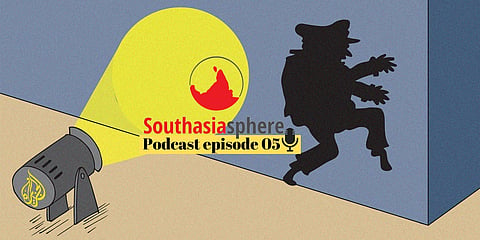Reinstatement of Nepal’s Parliament, Al Jazeera’s investigation on corruption in Bangladesh and more.
***
In this episode of Southasiasphere, we talk about the reinstatement of Nepal's Parliament and why these events reminded us of Sri Lanka's constitutional crisis in 2018. We also discuss a recent investigative report by Al Jazeera on high-level corruption in Bangladesh and the reactions it triggered in the country. Plus we introduced two new segments, including one on contemporary culture across Southasia. (We are still deciding on what to call this section. So send in your suggestions through our social-media pages or to our editorial email to win a copy of our right-side-up map!)
https://soundcloud.com/user-162273488/reinstatement-of-nepals-parliament-al-jazeeras-investigation-on-corruption-in-bangladesh-and-more
Himal Southasian Podcast Channel · Reinstatement of Nepal's Parliament, Al Jazeera's investigation on corruption in Bangladesh and more
***
Raisa Wickrematunge: Hi everyone and welcome to Southasiasphere, Himal Southasian's monthly round-up of news events and developing stories across Southasia. I'm Raisa, and I'm joined by my colleagues Shubhanga, Marlon and Shwetha. Hi guys!
Marlon Ariyasinghe: Hi
Shubhanga Pandey: Hi
Shwetha Srikanthan: Hi
RW: So our big stories in this edition include the reinstatement of Nepal's Parliament, and a thwarted attempt to bring sedition charges against Al Jazeera after the media group contributed to an investigation of high level corruption in Bangladesh.
Let's begin with a follow up on the situation in Nepal and why the situation there sounds so familiar to those of us following events in the region.Southasiasphere is our monthly podcast round of up news events and analysis of regional affairs. If you are a member, you will automatically receive links to the new episodes in your inbox. If you are not yet a member, you can still get it for free by signing up here.
***
In this episode of Southasiasphere, we talk about the reinstatement of Nepal's Parliament and why these events reminded us of Sri Lanka's constitutional crisis in 2018. We also discuss a recent investigative report by Al Jazeera on high-level corruption in Bangladesh and the reactions it triggered in the country. Plus we introduced two new segments, including one on contemporary culture across Southasia. (We are still deciding on what to call this section. So send in your suggestions through our social-media pages or to our editorial email to win a copy of our right-side-up map!)

